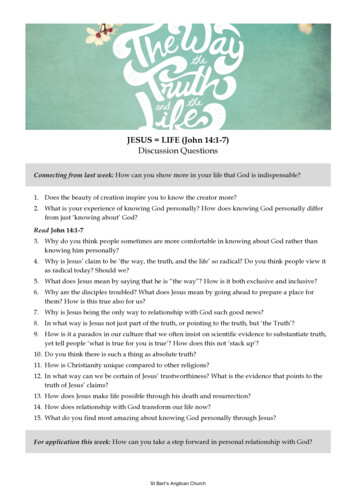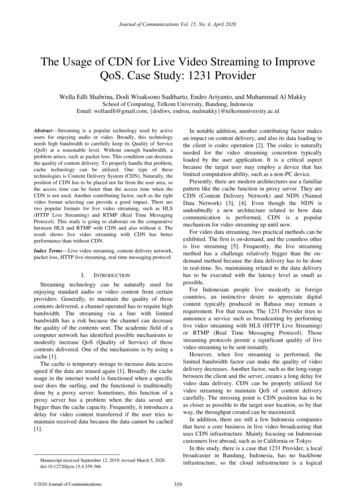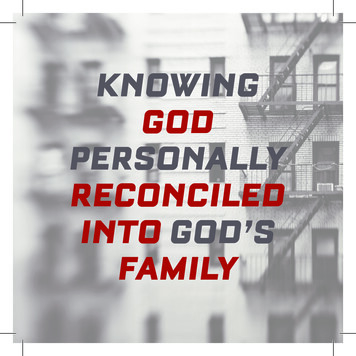
Transcription
Knowing GodStudy Series
TABLE OF CONTENTS1. Introductory Remarks . 32. Pre-Study: Seeking God Talk .43. Study #1: The Word of God . 54. Study #2: The Son of God . 75. Study #3: The Sin of Man . 96. Study #4: The Grace of God . 117. Study #5: The Lordship of Jesus . 138. Study #6: The Plan of Salvation . 159. Study #7: The Church of Jesus . 1810. Attachment A: Historical Manuscripts and Evidences of the Bible . 2011. Attachment B: Bible History . 2112. Attachment C: Sins of Galatians 5:19-21 . 2213. Attachment D: On the Physical Death of Jesus . 2314. Attachment E: Jesus I . 3215. Attachment F: Jesus II . 3416. Attachment G: Jesus III . 3617. Attachment H: Pride and Humility . 3918. Attachment I: The Many and the Few . 4219. Attachment J: The Big Picture . 452
“KNOWING GOD”Introductory RemarksCreating an evangelistic study series is no simple task. How does one decide which topics and scriptures to include andwhich to exclude? Should the series be comprised of only the Biblical “essentials” of salvation? What are thoseessentials? And what role does the religious and personal background of the prospective convert play in these questions?Can there be a study series that would fit any person from any background? One might ask, “What is the value of creatingsuch a series in the first place?” These are just some of the questions that must be considered before any attempt to createsuch a series is made.It is this author’s opinion that an evangelistic study series can be extremely helpful in leading the lost to Jesus. It ishelpful in training, equipping, and directing disciples to bring their friends to Christ. At the same time, it can be harmful.While the gospel is for all, a specific approach taken in a study series may not be. Every disciple must constantly searchthe scriptures, consider the needs of the friends they are instructing, and pray for wisdom so they can effectively leadthose friends to a relationship with God.The following study series is simply one approach to helping others find the joys of a real and lasting relationship withGod. It is designed to include the basic Biblical doctrines that will be helpful in such a conversion process, whileappealing to the common American experiences and backgrounds. While the Word itself cannot be compromised orchanged, this study series may need to be in order to help someone become a true Christian. It may need to be augmentedwith other studies to help some, or to be streamlined into fewer studies to help others.Here is an overview of the studies contained in the “Knowing God” series:Pre-Study: Seeking God Talk—A guideline to have a genuine talk with someone to inspire them to seek adeeper relationship with God by studying the Bible.Study #1: The Word of God—An overview of the role the Bible should play in our lives and in ourapproach to God.Study #2: The Son of God—An inspirational look at Jesus, as the author and perfecter of our faith.Study #3: The Sin of Man—An honest look at the heart of man and God’s thoughts on sin andrighteousness.Study #4: The Grace of God—A heart moving study of the incredible gift of God’s grace and the price ofthat grace, in Jesus’ sacrifice on the cross.Study #5: The Lordship of Jesus—A challenging overview of the response that the cross deserves and thecommitment that God expects from those who would follow him.Study #6: The Plan of Salvation—An exhaustive study on how to become a true Christian.Study #7: The Church of Jesus—An inspiring and informative study about what Jesus intended his churchto be.3
“KNOWING GOD”Pre-Study: Seeking God TalkIntroduction: There are times when someone may not be completely ready to begin regular Bible studies with you.Perhaps they are not very eager to know God in a deeper way; Or maybe they have not considered what it really means tohave a personal relationship with God; Or perhaps your relationship with them is not quite comfortable enough to launchinto the Word of God Study. That is where this “Pre-Study Talk” can be especially helpful. The purpose of this “PreStudy” is to inspire such a person to seek a deeper relationship with God by studying the Bible. I have called this a“Seeking God Talk” as it is much more casual than the other studies. While all of the subsequent studies should feel like“good talks” as well, this is especially the goal of this one.Key words: Genuine enthusiasmIt is a good idea to start this study with a good discussion about each other’s spiritual or religious background. Like Paulwrites in I Thessalonians 2:8, we are not only sharing the gospel but our lives as well. The more you get to know abouttheir personal background, the more you will be able to help them apply the Scriptures to their life. Without sounding likean interrogator, find out more about them, such as: their religious upbringing; whether or not they presently attend achurch; their thoughts and convictions about God, the Bible, etc. Again, the more you can get to know them, themore you can help them. Make sure you share about your own life as well, so they can get to know you.If they seem open enough to begin Study #1 The Word of God, then go directly to that. If not, then share one or both ofthe following passages:I.II.Acts 17:24-28 Look how much God wanted a relationship with man. What did He do to draw near to man? What did they have to do in order to find God? Seek Him. What does it mean to “seek God?” If someone really wanted to get closer to God, what would they do? Sharepersonally about why and how you began to seriously seek a deeper relationship with God. Do you want to seek a deeper relationship with God like that? Explain that you have some great, personal Bible Studies that you would love to share with them, so you canhelp them and help each other draw nearer to God.Jeremiah 29:11-13 God is sharing His vision for His people in that day. He had incredible plans to prosper them and not to harmthem; to give them hope and a future. Is it any different today? God has amazing plans for every life. If we are to discover those plans, we must first draw near to God. They only way to do that is to seek Him withall our hearts. What does that mean? Have you ever sought something with all your heart? Share about why and how you began to seek God with all your heart. Explain that you have some great, personal Bible Studies that you would love to share with them, so you canhelp them and help each other draw nearer to God. Set up the next study.4
“KNOWING GOD”Study #1: The Word of GodIntroduction: It is a good idea to start this study with a great talk about each other’s spiritual or religious background.Like Paul writes in 1 Thessalonians 2:8, we are not only sharing the gospel, but our lives as well. The more you get toknow about their personal background, the more you will be able to help them apply the scriptures to their life. Withoutsounding like an interrogator, find out more about them, such as: their religious upbringing; whether or not they presentlyattend a church; their thoughts or convictions about God and the Bible, etc. Again, the more you can get to know them,the more you can help them. Make sure you share about your own life as well, so that they can get to know you.This specific study will focus on the most important key to knowing God and knowing the truth about God—the Bible. Itis important to not rush past this study, assuming they already have a deep conviction about following God’s Word. Thepurpose of this study is to help your friend establish the Bible as God’s Word and God’s standard for their life.You can start by sharing how the Bible has impacted your life over the years. Then let them know you would like to sharesome things you have learned about the Word that have particularly helped you.III.Proof of the Word For years many have discounted the Bible holding that it cannot be trusted as reliable. However, history andarchaeology tell us otherwise. Before we even open the Word, let’s just talk about some historical factssupporting its authenticity. Historical Testing: These are the five primary tests that archaeologists and historians use to help determinewhether any ancient manuscript is factual. -Test of Handwritten Copies there are more ancient copies of the Bible than any otherancient manuscript-Test of Geography Biblical manuscripts spread throughout the entire known world.-Test of Time the writing, copying and spreading began around 1500BC and has neverended.-Test of External References thousands of references to the scriptures from outside sources-Test of Archaeology not one archaeological find has ever contradicted the Word, butthousands have supported it.Even today, the Bible has been translated into more languages than any other book in history.5
Other facts about the Bible:-Over 40 authors and 66 different books-3 languages—Hebrew, Aramaic, Greek-Over 1500 year period or writing-One common thread of God’s relationship to man holding it all together—amazing!-Approximately 400 prophecies regarding Jesus in the Old Testament were fulfilled in the New Testament[Note: For more information on Historical Manuscripts and Evidences of the Bible, see attachments A and B. Youmay also consult The New Evidence That Demands A Verdict by Josh McDowell.] Let’s see what the Bible says about itself in this regard:2 Peter 1:20-21 Men wrote the Bible, but they were “carried along by the Holy Spirit.” If God were to inspire abook, this is the kind of impact it would have!IV. The Purpose of the WordSo the Bible is from God, but what is it for?2 Timothy 3:16-17 It is useful for us to live righteous lives and completely equip us for every good work1 Timothy 4:16 It is crucial for salvationRomans 10:17 It helps us to know and believe in God and JesusV. The Power of the WordHebrews 4:12-13 The word can cut deep within our lives and reveal our hearts to God.John 8:31-32 If we hold to the Word, we will know the truth and be set free.Hebrews 1:1-3 Jesus’ words have the power to “sustain all things.”VI.The Priority of the WordMark 7:5-13 Priority over people and traditions (pastors, parents, friends, denominations, etc.)Acts 17:10-12 Priority in our daily livesJohn 12:47-48 Eternal priority, as we will be judged according to the WordConcluding Questions and Comments:Do you believe the Bible is the Word of God? What role do you think the Bible should play in your life? What canyou change in order to make it that way? Will you agree to read the Bible daily? Encourage them to imitate theBereans and read the Bible every day in order to form solid convictions. It is always a good idea to give them theassignment to review the entire study on their own. Remember, your goal is not just to “go through the studies”with them, but rather to help them develop their own convictions from God’s Word.6
“KNOWING GOD”Study #2: The Son of GodIntroduction: It is always a good idea to start every study with a review of the previous studies that have been done—repetition strengthens conviction. What did they learn from the previous study? Was there anything that they did notunderstand or disagreed with? Etc. Remember, the goal is not to just “go through the studies” with them, but rather to helpthem develop their own convictions from God’s Word. Are they reading the Bible daily?The purpose of this study is to instill a deeper understanding and appreciation for the life of Jesus. Far too often ithas been assumed that most people already have a solid understanding of who Jesus really is. While many have heard alot about Jesus, few have a Biblically complete view of his heart, character and ministry. This study is but one briefattempt to help someone gain such a view.You may want to start the study with an introductory statement like: “Today we are going to look at the most importantperson in real Christianity—Jesus. A lot of people have heard a lot of things about Jesus, seen the movies, etc, but fewreally have a solid understanding of what he was all about (perhaps share something from your life about how you werelike that). What are your thoughts about Jesus? Who was he really and what comes to mind when you think about him?Etc.”“Let’s look at some good scriptures that talk about Jesus, all from the gospel of John.”John 1:1-18 Incredible overview of the sovereignty and significance of Jesus:- He was with God from the beginning (vs.2)- All things were created through him (vs.3)- He was the Word (which was God) made into flesh (vs.14)- He came to make the Father known (vs.18)- He came to help people become children of God (vs.12-13) Twice this passage refers to Jesus as bringing grace and truth (vs.14 and 17) There is probably not a better way to summarize Jesus heart, life, character and purpose than with these two words. Itis said here that he was “full of grace and truth” and that he has “brought grace and truth.” It was who he wasand what he did. “Let’s look at some examples that demonstrate this and elaborate on it more.”I.Full of GraceWe often associate grace with the cross, and rightly so as we will study later, but grace was a huge part of Jesusdaily life and ministry. Let’s look at a few examples.John 8:1-11 What a great example of Jesus grace, shown by his compassion and eagerness to forgive.John 13:1-17 Another great example of his grace, shown by his humility and willingness to lower himself to serveothers.7
II.Full of TruthThe word “true” in one of its forms is used nearly 70 times in the gospel of John; it was a primary focus of Jesus ashe had much to say and teach. Let’s look at a few examples of his emphasis on truth.John 2:12-22 This passage shows Jesus’ courage to stand up for the truth that was being compromised by thereligious leaders of his day. Notice how he used the scriptures as his standard.John 8:31-32- You will know his teaching is true if you put it into practice.- “Real disciples” are the ones who put his words into practice.- Jesus’ truth “sets us free” from our sin.Concluding Questions and Comments:Does this overview help you understand Jesus better? There are many other scriptures throughout the gospel ofJohn, as well as the other three gospels that demonstrate that Jesus truly was “full of grace and truth.” Can youthink of any others that you have come across in your reading?As you continue to read through the gospels, look for these two qualities in his life and leadership—and strive toimitate them in your life as well.8
“KNOWING GOD”Study #3: The Sin of ManIntroduction: It is always a good idea to start every study with a review of the past studies that have been done—repetition strengthens conviction. What did they learn from the previous study? Was there anything that they did notunderstand or disagreed with? Etc. Remember, your goal is not to just “go through the studies” with them, but rather tohelp them develop their own convictions from God’s Word. How is their daily Bible reading going?The purpose of this study is to open their hearts to the seriousness and depth of their own sin. In order to facilitatethis, make sure that you do not come across “too preachy or teachy” but rather make it “a great talk.” Your own realnessand vulnerability are very important here.You may want to start the study with an introductory statement like: “Today we are going to talk about one of the mostmisunderstood and difficult topics to discuss, but one that has changed my life so much over the years. The topic is the sinof man.”I.Romans 3:23-24 What does it mean to sin? The word sin is harmatia in Greek, meaning “the comprehensive expression of everything opposed to God.” Itis more than just “doing wrong” as all sin is ultimately directed against God. Our goal is to be like God and in any way we fall short, we have “sinned.” Let’s look at another verse that talks about the consequence of sin.II.Romans 6:23 What does it mean to say “the wages of sin is death?”- Physical death: murder, war, etc.- Emotional death: guilt, fear, insecurity, anger, apathy, etc.- Relational death: divorce, bitterness, resentment, etc.- Spiritual death: not knowing God, worshiping objects or people, etc.- Eternal death: if you die apart from God, you will so remain forever Let’s look at another scripture about sin.III.Isaiah 59:1-2 What does this scripture say about the consequence of sin? Sin separates us from God. Draw the diagram of God and Man[See “The Big Picture” drawing, attachment J]In order for man to have a real relationship with God, the wall of sin must be broken down. The point in timethat happens is the point that a person is “saved.”Jesus came to break a hole in that wall and we will study more about that in the next study.Where do you think sin comes from?9
IV.Mark 7:20-23 Where does sin come from? It comes from within our own hearts; we cannot blame our environment, upbringing or society. Here, Jesus lists many specific sins. There are over 30 such lists like this in the NT alone; why do you think theBible is so specific? God wants us to know not just that we are “sinners” but what our specific sins are. It is humbling and difficultto be this specific about our sins, but that is how God wants us to be, or He would not have written it so. Let’s look at another list of specific sins.V.Galatians 5:19-21 (sins of commission) Notice the groupings of the sins listed here. The first group is sexual type sins, the second is spiritual type sins,the third is sins of the heart or relational type sins, and the fourth is sins of indulgence.[For detailed definitions of these sins, see attachment C] Living like this will result in eternal death. This might be a good time to share vulnerably from you own life about some of the sins you have struggledwith over the years. Some examples of additional lists of sin are Romans 1:21-32, I Corinthians 6:9-10, Revelation 22:14-15 Let’s look at a verse that speaks of a whole different type of sin.VI.James 4:17 (sins of omission) Not only is it sin to do what is wrong, but also to not do what is right. Can you think of any examples of this? Matthew 25:31-46 gives a great example of the sins of omissionVII. Genesis 6:5-6It is important to see sin as not just breaking a law, but as doing something that actually hurts God. He cares aboutus so much and wants a relationship with us so badly that His heart is filled with pain over our sin.Concluding Questions and Comments:What are your thoughts about these scriptures? Are there specific areas in your life that you think you need tochange? What are those areas? It would be helpful to have some honest and open confession at this point. How doyou think God feels about those sins? Ask them to review this study on their own and pray about the specific sins intheir lives—that they may identify them and overcome them.(Here are some scriptures to help them see the value of being open about their sins, if they need them—1 John 1:510, John 3:19-21, Ephesians 5:11-14)10
“KNOWING GOD”Study #4: The Grace of GodIntroduction: It is always a good idea to start every study with a review of the past studies that have been done—repetition strengthens conviction. What did they learn from the previous study? Was there anything that they did notunderstand or disagreed with? Etc. Remember, your goal is not just to “go through the studies” with them, but rather tohelp them develop their own convictions from God’s Word. Are they reading the Bible daily?The purpose of this study is to provide a heart moving overview of God’s amazing grace. This will be done bycommunicating both the gift of grace available to Christians as well as the price of that grace in Jesus’ death on the cross.You may want to start the study with an introductory statement like: “Today we are going to talk about one of the mostdriving forces in the heart of God and in the mission of Jesus. It is also the thing the makes the ‘good news’ such ‘goodnews’. It is the grace of God.”I.The Gift of GraceHow would you define grace? It is an undeserved gift.Let’s look at some verses that describe God’s grace given to Christians: Romans 6:23 The gift of eternal life; We deserved death, but received eternal life Ephesians 1:7-8 The gift of forgiveness Ephesians 2:1-10 The gift of salvation; A great description of our lives “before grace” and “after grace” 1 Peter 2:9-10 The gift of new identity- Before grace—in darkness, not a people, no mercy- After grace—in wonderful light, people of God, mercy- Thus, Christians are a chosen people, a royal priesthood, a holy nation and a people belonging to God. 1 John 3:1 The gift of a new relationship with God; By grace we can become true “children of God.”These are just a few verses summarizing the gift of God’s grace that is offered freely to anyone who is truly “inChrist”.II.The Price of GraceWhile the gift of grace is truly free to those in Christ, there was a great cost to God and Jesus. To fully appreciatethe gift, we need to fully understand the cost.Romans 3:23-26 The price was Jesus’ death on the cross; thus justice was served.Let’s take a deeper look at what really happened to Jesus on the cross. More than anything, what Jesusexperienced on the cross can be summarized as pain. There were three types of pain he felt—emotional, physicaland spiritual pain. Emotional Pain:Matthew 26:36-56- Jesus fell with his face to the ground- So much stress that he may have suffered from a medical condition called Hematidrosis, as recorded bythe physician Luke- Judas, one of his closest friends, betrays him with a kiss- All the disciples deserted him and fled11
Physical Pain:Matthew 27:22-26- Jesus was flogged- Centurions used a flagrum to do it—an instrument with a wooden handle, leather whips and pieces ofmetal or rock in the ends of the whips- The guards would stretch the person’s back out over a rock or tree and strike them repeatedly up to 39times (the legal limit).- Many would go into shock from such a beating or even die.Matthew 27:27-31- Soldiers put crown of thorns on Jesus’ head- They drove the thorns into his head with a staff- A hundred soldiers spitting on him and striking him and mocking himMatthew 27:31-44- Before this, Jesus’ face is black and blue and swollen, covered with dried blood and spit, his back istorn open and swollen.- The nail is placed between the ulna and the radius bones—right in a pressure point that is very sensitive- Other nail goes through the feet; Jesus hanging on cross by those nails- Most people die from suffocation, as carbon dioxide builds up in the lungs[For a detailed medical description of a crucifixion, see attachment D]Isaiah 52:14- Jesus was marred beyond human likeness- His arms would have been so stretched out from the hanging position; his head swollen, black and blueand covered with dried blood and spit; the rest of his body swollen and covered with blood and spit aswell Spiritual Pain: This would have been the worst pain of all2 Corinthians 5:21- God made Jesus become “sin” so that we could become “righteous”- Perhaps this is why Jesus cried out, “my God my God, why have you forsaken me” on the cross rightbefore he died. Jesus felt the nearly unbearable pain of separation from his Father in heaven for the firsttime in all eternity.That is the price Jesus paid. Why again did he do all this?Romans 5:6-8- A demonstration of his love; he would do anything to have a relationship with you!- A statement of the seriousness of sin; your sins necessitated this sacrificeIt is so important to personalize the cross—not just for man or the world, but for you! The grace of God is trulyamazing! It is an incredible gift that came at an incredible price.Concluding Questions and Comments:1. How does learning about the grace of God make you feel?2. Do you see how much God loves you? How much does He love you?3. How does this grace and love affect the way you view and understand your own sin?4. What kind of response does grasping God’s grace and love cause you to have?The next time we get together we will talk more about how we should respond to the grace of God.12
“KNOWING GOD”Study #5: The Lordship of JesusIntroduction: It is always a good idea to start every study with a review of the past studies that have been covered—repetition strengthens conviction. What did they learn from the previous study? Was there anything that they did notunderstand or disagreed with? Etc. Remember, your goal is not just to “go through the studies” with them, but rather tohelp them develop their own convictions from God’s Word. How is their daily Bible reading going?The purpose of this study is to convey what it really means to make Jesus the Lord of our lives. This is a crucialstudy because committing to the Lordship of Jesus is necessary for salvation, yet it has been quite “watered down” in oursociety today.Today we are going to study about what our response to the cross should really be and about what kind of commitmentGod expects of us if we are to truly be his followers. This response and commitment can be summed up in one word—LORDSHIP.What do you think it means to call someone Lord? It means they are the absolute master and ruler of your life; whateverthey say, goes! Let’s look at some verses that talk about this.Philippians 2:5-11 A great summary of Jesus’ life and death, culminating with the fact that he is Lord of all; that everyknee should bow to him. He really cannot be savior without being Lord; the two go hand in hand as he is both.When one sees what an incredibly loving savior he is, it motivates them to eagerly accept his Lordship.What does it mean to really make him the Lord of your life? It means to be in complete subservience to Jesus; to have hiswill and his word become the final authority in your life. It means to follow him and become a true disciple of his.When Jesus walked the earth he taught about what it really meant to follow him and become his disciple. Let’s look atsome of these passages and let him define his own Lordship. For outline sake, we will group these verses into a fewspecific areas over which He should be Lord.I.Lord of DoctrineJohn 8:30-32- Real disciples hold to Jesus’ teaching over all else- Over opinions, traditions, emotions, etcJohn 14:15, 23-24- Loving Jesus and obeying him go hand in hand- What are the most difficult areas for you to obey Jesus’ words in?II.Lord of PrioritiesLuke 9:23-26- This is the commitment of a disciple- Foundational heart of self-denial- Same standard for everyone- What areas do you think you will need to deny yourself in?- (share examples from your life)13
Luke 14:19-26- “Hate” is the comparative difference between two loves- Everything is second to Jesus—people, things and self- What would be the most challenging thing for you to give up?III.Lord of RighteousnessMark 9:43-49- Jesus was serious about sin- To make Jesus Lord is to adopt his radical indignation of sin- What areas of your life would Jesus call you to “cut off”?- (again, make sure you are sharing personally as well)IV.Lord of RelationshipsJohn 13:34-35- Jesus expects his disciples to love like he loved- This is inspiring—to have others love you like that- This is challenging—to love others like that- What can you change to really love others like Jesus did?V.Lord of Our MissionMatthew 28:18-20- Jesus’ vision for the world is for true disciples to fill the earth- His dream is for everyone to make him their Lord- He calls those who are disciples to help others become disciples—this is the mission of a disciple.Mark 1:16-18- Jesus quickly communicated to his prospective disciples the mission he would later give them.- Note their immediate and wholehearted response. Why do you think they responded in this manner?- What are some things you can change in your life in order to help others know Jesus?Concluding Questions and Comments:Do you accept Jesus as the Lord of your life? Why are you willing to do so? What are some things that mustchange in your life to reflect his Lordship?14
“KNOWING GOD”Study #6: The Plan of SalvationIntroduction: It is always a good idea to start every study with a review of the past studies that have been covered—repetition strengthens conviction. What did they learn from the previous study? Was there anything that they did notunderstand or disagreed with? Etc. Remember, your goal is not just to “go through the studies” with them, but rather tohelp them develop their own convictions from God’s Word. How is their daily Bible reading going?The purpose of this study is to present a clear and comprehensive picture of how people became Christians in thefirst ce
Here is an overview of the studies contained in the “Knowing God” series: Pre-Study: Seeking God Talk —A guideline to have a genuine talk with someone to inspire them to seek a deeper relationship with God by studying the Bible. Study #1: The Word of God —An overview of the role the Bible should play










